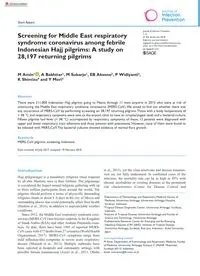
2018 Screening for Middle East respiratory syndrome coronavirus among febrile Indonesian Hajj pilgrims_ A study on 28,19 PDF
Preview 2018 Screening for Middle East respiratory syndrome coronavirus among febrile Indonesian Hajj pilgrims_ A study on 28,19
https://doi.org/10.1177/1757177418765634 Journal of Infection Prevention 1 –4 © The Author(s) 2018 Reprints and permissions: sagepub.co.uk/journalsPermissions.nav DOI: 10.1177/1757177418765634 jip.sagepub.com Journal of Infection Prevention Introduction Hajj (pilgrimage) is a mandatory religious ritual required by all able Muslims once in their lifetime. The pilgrimage is considered the largest annual religious gathering with up to three million participants from around the world. The pilgrims should perform a series of physically demanding religious rituals in about 5–6 days in the city of Mecca and surrounding places that could potentially affect their health (Hashim et al., 2016), in addition to unpredictable weather conditions. Since 2012, the Middle East respiratory syndrome coro- navirus (MERS-CoV) has become endemic in the Kingdom of Saudi Arabia (KSA) and other Arabian Peninsula coun- tries. To date, there have been 1905 of reported MERS- CoV cases with 677 deaths from 27 countries (World Health Organization, 2017). MERS-CoV symptoms range from mild influenza-like symptoms to severe acute respiratory disease (Memish et al., 2013). Multiple outbreaks have been reported in hospitals and community settings with possible human transmission (Assiri et al., 2013; Oboho et al., 2015), yet the virus reservoirs and disease transmis- sion are not fully understood. In confirmed cases of the infection, the mortality rate can be as high as 45% with chronic morbidities or existing diseases as the prominent risk characteristics (Center for Disease Control and Screening for Middle East respiratory syndrome coronavirus among febrile Indonesian Hajj pilgrims: A study on 28,197 returning pilgrims M Amin1 , A Bakhtiar1, M Subarjo1, EB Aksono2, P Widiyanti3, K Shimizu4 and Y Mori4 Abstract There were 211,000 Indonesian Hajj pilgrims going to Mecca through 11 main airports in 2015 who were at risk of contracting the Middle East respiratory syndrome coronavirus (MERS-CoV). We aimed to find out whether there was any occurrence of MERS-CoV by performing screening on 28,197 returning pilgrims. Those with a body temperature of > 38 °C and respiratory symptoms were sent to the airport clinic to have an oropharyngeal swab and a bacterial culture. Fifteen pilgrims had fever (> 38 °C) accompanied by respiratory symptoms; of these, 12 patients were diagnosed with upper and lower respiratory tract infections and three patients with pneumonia. However, none of them were found to be infected with MERS-CoV. The bacterial cultures showed evidence of normal flora growth. Keywords MERS-CoV, pilgrims, screening, Indonesia Date received: 24 July 2017; accepted: 19 February 2018 1 Department of Pulmonology and Respiratory Medicine Faculty of Medicine, Universitas Airlangga, Universitas Airlangga Hospital, Surabaya, Indonesia 2 Tropical Disease Diagnostic Center, Universitas Airlangga, Surabaya, Indonesia 3 Institute of Tropical Disease, Universitas Airlangga and Faculty of Science and Technology, Universitas Airlangga 4 Collaborative Research Center for Emerging and Re-Emerging Infectious Diseases (CRC-ERID), Institute of Tropical Disease, Universitas Airlangga, Surabaya, East Java, Indonesia - Kobe University, Japan Corresponding author: M Amin, Department of Pulmonology and Respiratory Medicine, Faculty of Medicine, Universitas Airlangga, Kampus C UNAIR, Mulyorejo, Surabaya 60115, Indonesia. Email:
